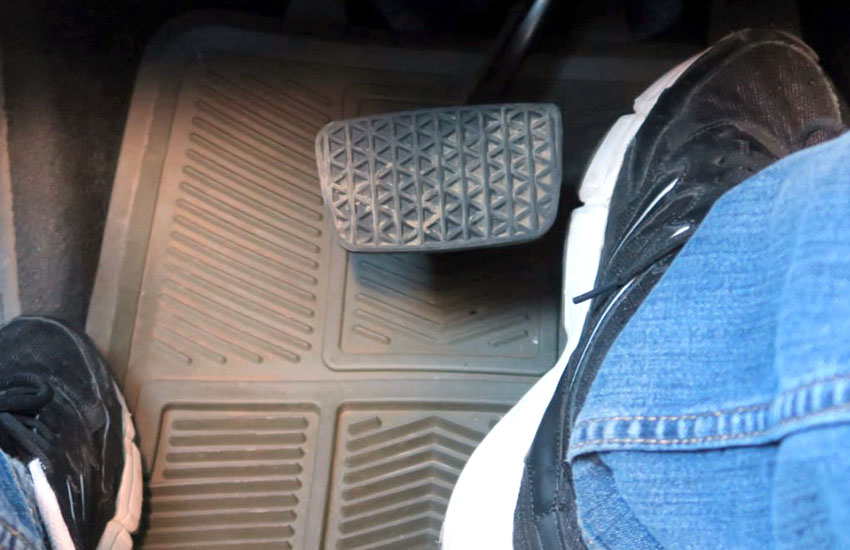Do you ever hear a clicking noise when you press your car’s brake pedal? It can be annoying and concerning. But don’t worry! In this article, we’ll explore why your car might be making that clicking sound when you hit the brakes.
We’ll discuss common causes such as worn-out brake pads, loose brake calipers, or damaged brake hardware. Plus, we’ll give you some easy fixes to get your brakes working quietly and safely again. Let’s dive in and learn together!

Understanding Brake Systems
Understanding brake systems can help identify the causes and fixes for a car making a clicking sound when pressing the brake pedal. Common causes include worn brake pads, loose caliper bolts, or damaged brake rotors. Book a professional inspection to diagnose and address the issue promptly.
How Brake Systems Work
Understanding how brake systems work is essential in diagnosing and fixing the clicking sound when pressing the brake pedal. Essentially, brake systems work by converting kinetic energy into thermal energy through friction. When you press the brake pedal, it activates a hydraulic system that transfers the force to the brake pads, causing them to clamp down on the brake rotors, and ultimately slowing down or stopping the vehicle.
Components Of Brake Systems
Brake systems consist of several key components that work together to ensure efficient braking and road safety. These components include:
- Brake Pedal: A pedal you push with your foot to make the car stop.
- Master Cylinder: A part that turns the push on the brake pedal into hydraulic power.
- Brake Lines: Tubes that carry brake fluid from the master cylinder to the brakes.
- Brake Calipers and Wheel Cylinders: Parts with pistons that squeeze the brake pads or shoes against the rotors or drums.
- Brake Pads and Shoes: Materials that rub against the rotors or drums to make the car slow down.
- Brake Rotors and Dru
These components work in harmony to ensure the safe operation of your braking system. However, issues with any of these components can result in a clicking sound when pressing the brake pedal. It is important to identify and remedy these issues promptly to maintain optimal braking performance and ensure your safety on the road.
Common Causes Of Clicking Sound
When your car makes a clicking sound while pressing the brake pedal, it can be a cause for concern. Identifying the source of the clicking noise is essential for maintaining safe driving conditions. In this section, we’ll explore the common causes of clicking sounds in a car’s brakes and their respective fixes. This will help you understand the potential issues and take appropriate action to ensure your vehicle operates smoothly and safely.
Worn Brake Pads
One of the primary causes of clicking sounds when pressing the brake pedal is worn brake pads. Brake pads are designed to provide friction and stop the vehicle when the brakes are applied.
Over time, the pads can become worn down, leading to a clicking sound as they move within the caliper assembly. This issue should be addressed promptly to prevent further damage to the braking system.
Loose Brake Calipers
Another common culprit behind the clicking noise is loose brake calipers. The calipers are responsible for holding the brake pads in place and facilitating the application of pressure to the rotor.
If the calipers become loose or improperly installed, they may produce a clicking noise when the brakes are engaged. Proper inspection and tightening of the calipers can resolve this issue, ensuring the brakes function as intended.
Other Possible Causes
Aside from the common causes discussed earlier, there are some other potential reasons why your car may make a clicking sound when you press the brake pedal. Let’s explore these possibilities:
Faulty Brake Rotors
If your brake rotors are worn out or damaged, they can cause a clicking sound when you apply the brakes. Brake rotors are responsible for providing a smooth surface for the brake pads to grip, allowing for effective stopping power. However, over time, the rotors can become warped, develop cracks, or have uneven surfaces due to wear and tear.
To check if faulty brake rotors are the culprit behind the clicking sound, you can inspect them visually. Look for any signs of damage such as deep grooves, cracks, or an uneven surface. If you notice any of these problems, it’s advisable to replace the brake rotors. Remember, worn or damaged brake rotors can compromise your vehicle’s braking performance and safety.
Damaged Brake Pedal Assembly
The brake pedal assembly is another component that can contribute to a clicking sound when you press the brake pedal. Over time, the pedal assembly can wear out, develop loose connections, or accumulate dirt and debris. These issues can cause the pedal to move irregularly, resulting in a clicking noise.
To determine if a damaged brake pedal assembly is to blame, you can inspect the pedal assembly for any signs of wear or loose connections. Check if there are any visible damages or if the pedal feels loose when pressed. If you identify any problems, it may be necessary to repair or replace the brake pedal assembly to eliminate the clicking sound and ensure proper brake operation.
Keep in mind that if you’re not comfortable inspecting or repairing these components yourself, it’s always best to consult a qualified mechanic. They have the expertise and tools to diagnose the issue accurately and provide the necessary fixes.
Diagnosing the Issue
One common issue that drivers often encounter is a clicking sound when they press the brake pedal. This clicking sound can indicate a problem with the brake system that needs attention. In this section, we will discuss the various steps involved in diagnosing and resolving this issue, starting with listening for the clicking sound.
Listening for the Clicking Sound
Diagnosing the clicking sound requires a keen ear and attentiveness while driving. When you press the brake pedal, listen carefully for any clicking or ticking noise that emanates from the brake system.
It is essential to try this in different driving scenarios, such as during acceleration, deceleration, or at different speeds. Pay attention to whether the clicking sound occurs consistently or intermittently, as this will provide valuable clues for identifying the underlying issue.
Visual Inspection of Brake Components
After identifying the clicking sound, the next step in diagnosing the issue is to visually inspect the various brake components. This inspection can help you identify any visible problems that may be causing the clicking sound.
Start by checking the brake pads, rotors, and calipers for signs of wear, damage, or misalignment. Look for any loose or broken components that could be causing the clicking noise.
If you are not familiar with the brake system’s components, it may be helpful to consult your vehicle’s manual or seek professional assistance. Taking pictures or recording videos during the inspection can help you document any abnormalities and provide a visual reference for further analysis.
In addition to the brake components, also inspect the brake lines and hoses for any leaks or signs of damage. A damaged brake line or leaking hose can also lead to a clicking sound when the pedal is pressed.
Remember, the visual inspection is a crucial step in diagnosing the issue, so take your time and thoroughly check each component for any potential problems.
Fixing the Clicking Sound
If your car makes a clicking sound when you press the brake pedal, there are a few common causes and fixes that you can explore. The clicking sound can be indicative of various issues related to the brake system.
It is essential to address this noise promptly, as it could be a sign of a potential safety concern. Below are some potential fixes that you can consider to resolve the clicking sound in your car’s braking system.
Replacing Worn Brake Pads
If the clicking sound is originating from the front end of the car, worn brake pads could be the culprit. Worn brake pads can produce clicking sounds when they come into contact with the rotors while braking. Replacing the worn brake pads with new ones can eliminate this issue. It is advisable to consult a professional mechanic to inspect and replace the brake pads as needed.
Tightening Brake Calipers
Loose or improperly positioned brake calipers can also result in a clicking sound when the brakes are applied. Tightening the brake calipers to the manufacturer’s specifications can help resolve this issue.
Ensure that the calipers are securely fastened to the rotor and bracket, as loose calipers can create unnecessary movement and produce clicking noises. It is recommended to have a qualified technician check and adjust the brake calipers if needed.
I hope this helped you learn more about why your car makes a clicking sound when you press the brake pedal and how to fix it. Remember, this clicking sound could be caused by different things like worn-out brake pads, loose brake calipers, or even something as simple as a small stone stuck in the brakes.
If you notice this sound, it’s important not to ignore it because brakes are super important for your safety. Ignoring it might make the problem worse and more expensive to fix later on. So, if you hear that clicking, it’s best to get it checked out by a mechanic as soon as you can.
Sometimes, fixing the issue might be as easy as cleaning out any debris from the brakes, while other times, it might require replacing some parts. But whatever the solution, taking care of it promptly will keep you and your car safe on the road.
And hey, don’t worry if you’re not sure what’s causing the sound. Mechanics are there to help you out and get your car back in tip-top shape. Just make sure to explain the sound you’re hearing so they can diagnose and fix the problem quickly.
So, keep those brakes in good condition, and happy driving!


